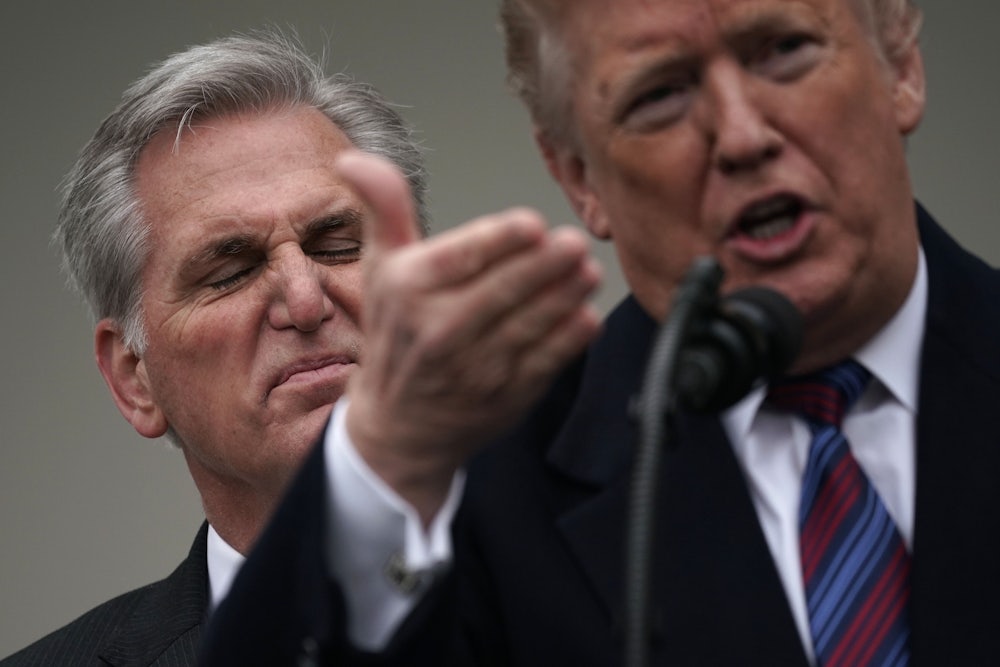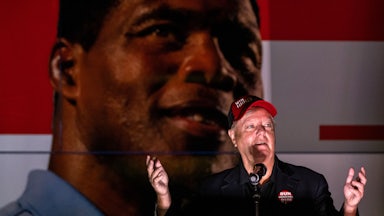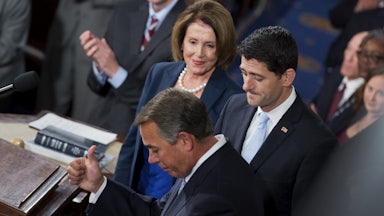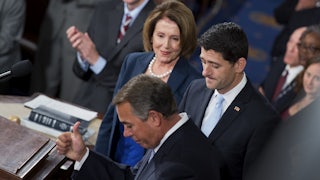Forget whatever the polls are saying about who’s up and who’s down in the GOP presidential primary; these numbers are worse than worthless two years before the next election. If you want to gauge former President Donald Trump’s standing within the Republican Party, there’s a more reliable indicator: Kevin McCarthy, the human weather vane.
McCarthy, of course, is also the House Republican leader and, presumptively, the next speaker, having easily bested a challenge from Arizona hardliner Andy Biggs earlier in the week. But Biggs garnered the support of 31 House Republicans, more than enough to derail McCarthy if they persist in their opposition and refuse to vote for him on the House floor—a fact to which the spurned challenger is clinging.
“I cannot vote for Kevin McCarthy as House Speaker,” Biggs tweeted Friday. “I do not believe he will ever get to 218 votes, and I refuse to assist him in his effort to get those votes.”
This relates to Trump because reporters asked McCarthy about whether he supports the twice-impeached con artist’s 2024 presidential bid. “You guys are crazy,” was McCarthy’s faux-shucks response, circumspectly avoiding the question. Which only makes sense: This is familiar territory for Republicans of the Trump era. Right now, we’re in the phase of the Trump-GOP cycle where the former president has said or done something stupid, self-indulgent, irresponsible, inflammatory, or just plain disastrous—often some combination thereof—and Republicans are wondering why they put up with him. Trump’s current grievous sin is that he foisted a series of toxic candidates on the GOP in winnable midterm races, certainly costing it control of the Senate.
And, as McCarthy is undoubtedly aware, Trump’s corrosive reach extended past the other chamber, losing Republicans governorships and House seats too. Philip Wallach of the conservative American Enterprise Institute, for example, compared Trump-endorsed candidates in the 114 closest House races with those who didn’t get his imprimatur. Trump’s candidates performed seven percentage points worse than the others, Wallach found. He figures that Trump directly cost House Republicans at least five seats, a number that might have doubled the GOP’s margins in the next Congress. As with so many other past sagas—Trump’s attacks on Gold Star families, the Access Hollywood tape, his slagging of John McCain and other POWs—there is ample cause for McCarthy to make a clean break. That he’s assiduously avoiding stepping into the middle of this presidential primary despite the fact that its one known participant was instrumental in wrecking his party’s chances in the last election speaks volumes.
But we’ve been here before. On January 6, 2021, as Trump’s supporters were prowling the halls of Congress in search of House Speaker Nancy Pelosi and chanting about hanging Vice President Mike Pence, the president did his best Nero impression, pausing long enough to take a call from McCarthy. “Well, Kevin, I guess these people are more upset about the election than you are,” Trump said. McCarthy’s reply was justifiably heated: “More upset? They’re trying to fucking kill me!”
It was a brief and private flash of humanity for a member whose public profile is that of an empty suit with a blow-dryer and a set of talking points. He even let his anger flash in public a week later, declaring that Trump “bears responsibility” for the attack, adding: “These facts require immediate action by President Trump.”
But as Grace Segers and Daniel Strauss observed in a thorough profile of McCarthy in these pages last summer, “McCarthy’s allies and friends say that his political skill lies in his ability to identify who has power and cozy up to them.” Trump wouldn’t be the one to take action: The GOP leader’s nose for power took him down to Mar-a-Lago before the month was out, where he ingratiated himself with the weirdly still-empowered Trump. Sure, Trump had put McCarthy and his members in actual, physical danger. Which definitely seems like a dealbreaker! But on the other hand, a critical mass of Republican voters remain mesmerized by the former reality TV star, so McCarthy—“My Kevin,” as the former president calls him—fell in line.
Nothing is too petty to evade McCarthy’s power calculus. While few of his party showed up for House Speaker Nancy Pelosi’s valedictory address as House speaker, McCarthy’s absence was especially notable. Not for him to go against the grain just because of fusty notions like courtesy, respect, and norms of behavior. Michael Tomasky aptly described McCarthy’s ghosting as the latest evidence that he “is just a churlish, childish bottom feeder.”
Now Trump is sufficiently weakened that McCarthy feels free to laugh off questions about his candidacy. But Trump isn’t going away anytime soon—and certainly not by the time McCarthy finds himself in need of 218 votes to become speaker when the 118th Congress gavels in next year. Trump did endorse McCarthy earlier this month, but that occurred against the backdrop of a looming, if ultimately illusory, red wave. Things change. Days after the midterm debacle, Trump aide Jason Miller declared on the podcast of on-again, off-again Trump ally Steve Bannon that McCarthy “must be much more declarative that he supports President Trump” if he wants to be speaker.
Two days after Trump announced his candidacy for president, McCarthy has been anything but declarative about his support. No surprise: McCarthy won’t act until he knows which way the wind is blowing. If he regains his “My Kevin” status, it will be because his members return to the Trump fold first—which, judging by history, they well might. “Kevin will do whatever he has to do to get 218,” a well-connected Republican lobbyist told me. “And if he has to blow Donald Trump, he will—to get the votes. That’s what matters—it’s not about Trump, it’s about the people who can make the demands that he support Trump.”
That’s perhaps the ultimate irony of McCarthy’s monomaniacal quest for the House’s top leadership position: The only thing that will make all of this degrading supplication to Trump worth it is to achieve the speakership. And so in order to become the leader, McCarthy has had to become a follower of the first order. The Hill’s Juan Williams captured him perfectly last month, recalling a quote from a French revolutionary leader: “There go the people. I must follow them, for I am their leader.” How will it end? Just watch him spin.










